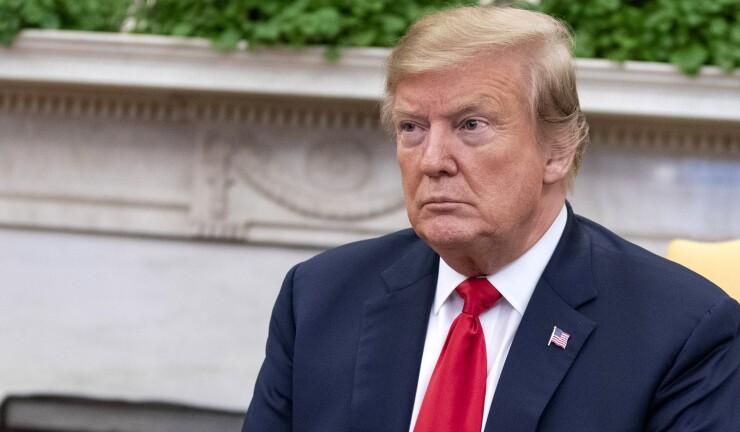President Donald Trump, under siege from House Democrats weighing impeachment, suffered a stinging blow as a federal appeals court upheld a subpoena ordering his accountants to provide Congress with his financial records.
The ruling, by a three-judge panel of the U.S. Court of Appeals in Washington, means Trump will lose control of his long-secret financial records at Mazars USA LLP unless the full court reconsiders the decision or the U.S. Supreme Court blocks it. In a 2-1 decision, the judges rejected arguments made by lawyers for the president that the House Oversight and Reform Committee had no legitimate legislative reason to seek the information.
“Disputes between Congress and the president are a recurring plot in our national story,” U.S. Circuit Judge David Tatel wrote in the majority’s 66-page opinion. “And that is precisely what the Framers intended.” He quoted the late Supreme Court Justice Louis Brandeis, who said that the purpose of the separation of powers was “to save the people from autocracy.”

Trump attorneys William Consovoy and Stefan Passantino and a spokeswoman for the House Oversight Committee did not immediately reply to an emailed request for comment.
The ruling comes just days after Mazars was ordered by a federal district court to turn over his tax filings and other financial records to New York state prosecutors, though the president won a last-minute delay pending an emergency appeal.
Trump, the Trump Organization and the president’s three oldest children have steadfastly refused to surrender their records to Congress. Armed with the documents, Democratic lawmakers will be able to more fully explore any conflicts of interest in the executive branch and whether the president has violated the Constitution’s emoluments clauses.
“There’s a lot of speculation, but it seems that the accounting firm has tax returns and other documents that will show President Trump and his family and associates involved in all sorts of deals,” Washington lawyer David Dorsen, who served as assistant chief counsel to the U.S. Senate’s Watergate Committee in the 1970s, said in an interview before the ruling was issued. Lawmakers will want to know whether documents show “payoffs to people in Russia, Ukraine and elsewhere,” he said.
“That would be an enormous, enormous factor in what’s going on now,” he added.
Congress’s demand for the business records came before it began its official impeachment inquiry. That probe was triggered by a whistle-blower’s claim that Trump asked Ukraine’s president to investigate Democratic presidential candidate Joe Biden and held back military aid Congress had appropriated to resist Russian influence in the region.
But the disclosures made possible by Friday’s ruling by the U.S. Court of Appeals in Washington Circuit pose further risks for the president if they raise new questions about Trump, his finances or his company.
“I think that’s the way the framers designed the Constitution,” said Steven Schwinn, a professor at the University of Illinois’s John Marshall Law School in Chicago. “Congress has oversight authority to request information like this, and the president really does not have authority to stonewall.”
The decision by the three-judge panel — with Democratic appointees, Tatel and Patricia Millett in the majority and one judge Trump named, Neomi Rao, dissenting — isn’t the last word on the subject. Along with possible appeals in this case, a federal appeals court in New York is weighing a similar request for records from Trump’s bankers at Capital One Financial Corp. and Deutsche Bank AG. The U.S. Supreme Court may eventually weigh in.
Rao, in her dissent, said Congress can investigate allegations of illegal conduct against the president only as part of an impeachment process and not through its legislative power. Allowing the subpoenas to be honored “would turn Congress into a roving inquisition over a co-equal branch of government,” she wrote.
“The most important question is not whether Congress has put forth some legitimate legislative purpose, but rather whether Congress is investigating suspicions of criminality or allegations that the President violated a law,” Rao wrote, and the House “may not use the legislative power to circumvent the protections and accountability that accompany the impeachment power.”
Breaking with four decades of presidential tradition, Trump has declined to make his detailed financial records public. Acting in his personal capacity rather than as president, he sued in April to stop Mazars from handing over his records after they had been subpoenaed by the House committee. He lost in federal district court in May and appealed.
Democrats told the appellate panel on July 12 that they need the Trump records as they consider mandating heightened disclosure requirements for those who hold high office. Trump argued that Congress’s request had no legitimate legislative purpose and should be rejected. The accounting firm took no position.
The Mazars case is one of several testing Congress’s power to obtain a sitting president’s financial records in the name of oversight, with significant implications for the relationship between the executive and legislative branches. A ruling in the president’s favor in this case would have been “a very significant change in the balance of power, because it would represent a significant narrowing of congressional subpoena power,” said David Sklansky, a law professor at Stanford University.
The president is also embroiled in lawsuits with the House Ways and Means Committee, which is trying to get six years of Trump tax records from the U.S. Internal Revenue Service and has the standing right to request similar information from the state of New York. Meanwhile, the Mazars records have been targeted by Manhattan District Attorney Cyrus Vance Jr. A federal judge in Manhattan ordered Mazars to comply with the subpoena, but Trump has appealed.
The case is Trump v. Mazars USA LLP, 19-5142, U.S. Court of Appeals, District of Columbia Circuit (Washington).
— Andrew Harris, with assistance from Chris Dolmetsch
Bloomberg News





